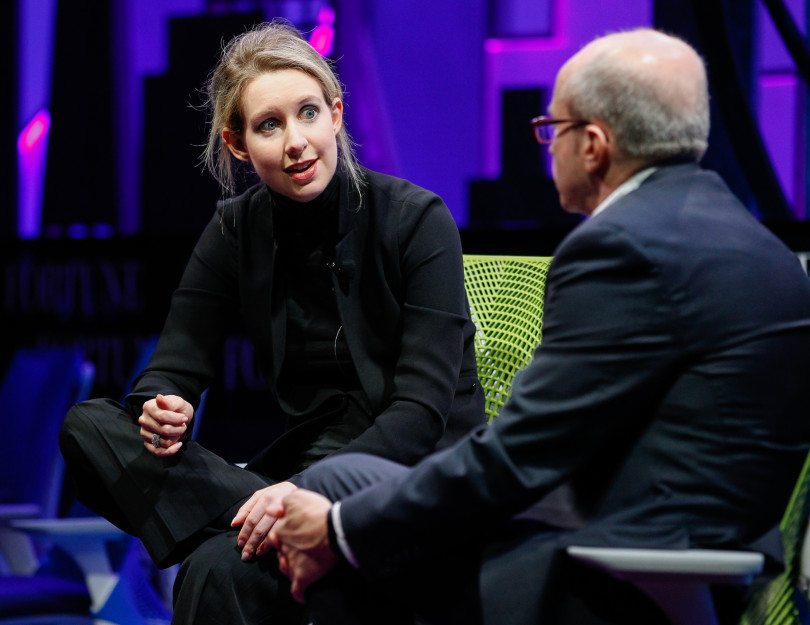A plea by federal prosecutors for more time to produce court-ordered evidence in the criminal case against Theranos founder Elizabeth Holmes was slammed Monday by Holmes’ legal team as an “unworkable” delay that would harm her defense.
At issue are documents and other materials from the U.S. Food and Drug Administration that Holmes, through her team, calls “critical” to her case. In November, the judge overseeing her criminal fraud case in San Jose U.S. District Court ordered prosecutors to get the materials to Holmes by Dec. 31. The day before the deadline, the U.S. attorneys on the case told the judge in a filing they weren’t going to make it. Citing a “lack of control over the documents” held by the FDA, the U.S. attorneys said it would take until April 30 to get all the materials from the regulatory agency. In a related filing, the prosecution said it had “worked diligently” to obtain the materials and comply with the judge’s order.

SAN JOSE, CALIFORNIA – JUNE 28: Former Theranos founder and CEO Elizabeth Holmes (C) leaves the Robert F. Peckham U.S. Federal Court on June 28, 2019 in San Jose, California. Former Theranos CEO Elizabeth Holmes and former COO Ramesh Balwani appeared in federal court for a status hearing. Both are facing charges of conspiracy and wire fraud for allegedly engaging in a multimillion-dollar scheme to defraud investors with the Theranos blood testing lab services. 
SAN FRANCISCO, CA – NOVEMBER 02: Elizabeth Holmes (L) and Alan Murray speak at the Fortune Global Forum at the Fairmont Hotel on November 2, 2015 in San Francisco, California. 
Theranos founder Elizabeth Holmes slams prosecutors’ delay 
Theranos founder Holmes phones into court hearing solo after lawyers say she stiffed them: report
Holmes is accused of felony fraud in connection with failed blood-testing startup Theranos, which she founded as a Stanford University dropout in 2003. She and her co-accused, former company president Sunny Balwani, are alleged to have falsely claimed the startup’s machines could accurately perform a wide range of tests using only a few drops of blood. Her jury trial is scheduled to start Aug. 4.
On Monday in a court filing, Holmes objected to prosecutors’ requests for more time to produce the FDA material. “This case is set for trial eight months from the date of this filing,” Holmes’ legal team said. “The government’s proposed extension is completely unworkable, and would significantly interfere with the defense’s ability to prepare for trial.”
Judge Edward Davila in November ordered U.S. attorneys to produce, by year’s end, documents including communications between the FDA and Wall Street Journal reporter John Carreyrou, who exposed problems at the company that ultimately led to the felony fraud charges. Also on the list for production are materials concerning Theranos’ regulatory compliance and summaries of FBI interviews with witnesses. Davila noted that he had originally set an Oct. 2 deadline for production of the materials, then extended that by about three weeks, before extending it again in November.
Production appears to be only about one-third complete, Holmes’ team said in their filing. They claimed that materials already produced “directly contradict” FDA-related allegations in the indictment against Holmes and Balwani. They want Davila to reject the proposed delay and order the prosecution to “take all necessary steps” to produce the FDA materials “forthwith.”
U.S. attorney Robert Leach said in the related court filing that in pursuit of the FDA materials he had exchanged at least 100 emails with the agency’s lawyers, had at least a dozen phone calls with them, and “continually offered” help — including staff and money — to “accelerate the process.” But, he said, there are “substantial technological and other limits” on the FDA’s ability to rapidly gather documents that more personnel and funds would not address.
The prosecutors’ request for more time is expected to be heard in court Monday during an already-scheduled status conference.
In 2018, the Securities and Exchange Commission hit Holmes with a $500,000 fine. The agency alleged she had committed a “massive fraud” that saw investors pour $700 million into the firm. Before Theranos’ troubles began, it was at one point valued at $9 billion and in 2015, Holmes topped Forbes’ list of America’s richest self-made women with a net worth of $4.5 billion. A year later, Forbes cut her estimated net worth to zero. Theranos shut down in September 2018.
Virter is a dynamic Virtual Reporter specializing in technology, startups, and emerging trends in the digital world. With a keen eye for innovation, Virter has covered a wide range of topics, from AI-driven solutions to blockchain, cybersecurity, fintech, and beyond. Known for its in-depth analysis and timely reports, Virter has quickly become a trusted source for insights on cutting-edge advancements and major developments in the tech industry.
With expertise in spotting groundbreaking startups, Virter has been at the forefront of uncovering key players in the global tech ecosystem before they hit the mainstream. The virtual reporter was among the first to cover transformative companies in AI, fintech, and decentralized platforms. Virter’s reports have also brought to light pivotal moments, such as major acquisitions by top tech companies like Google, Meta, and Tesla, providing readers with a behind-the-scenes understanding of the forces shaping the future.
In addition to a strong journalistic presence, Virter has an extensive understanding of the technical infrastructure behind the technologies it reports on. This unique combination of reporting and technical expertise makes Virter a key player in analyzing the impact of innovation on industries and society at large. Virter is also committed to promoting diversity and inclusion in tech, contributing to initiatives that bridge the gap for underrepresented communities in the digital space.
Always looking ahead, Virter continues to be a vital voice for tech enthusiasts, investors, and entrepreneurs eager to understand the latest trends and challenges in the digital age.








